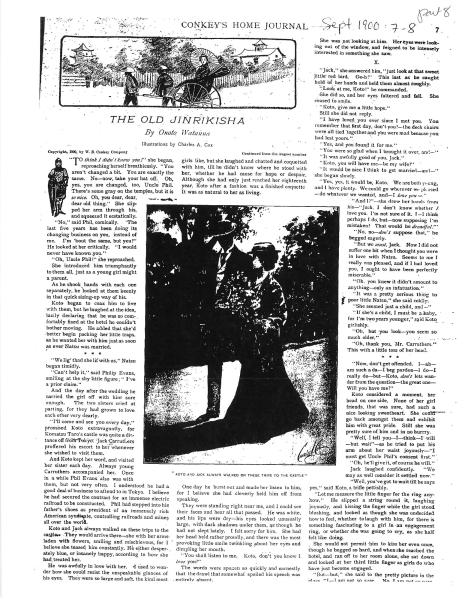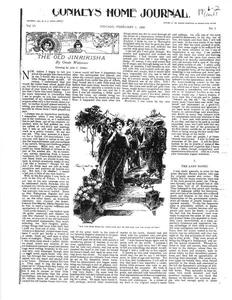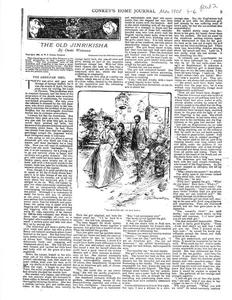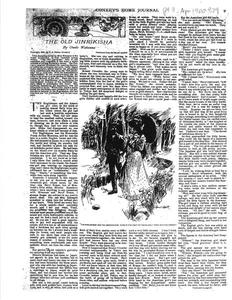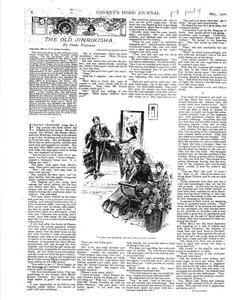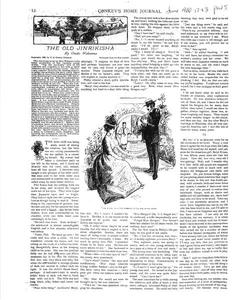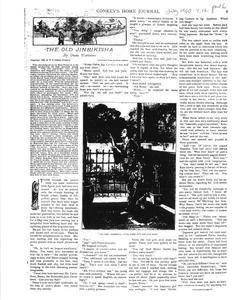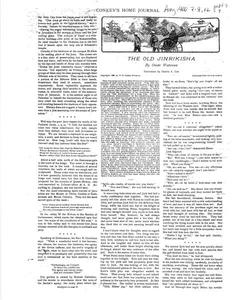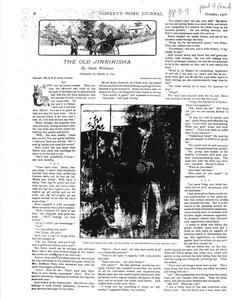IX. (continued)
“To think I didn’t know you!” she began, reproaching herself breathlessly. “You aren’t changed a bit. You are exactly the same. No—-now, take your hat off. Oh, yes, you are changed, too, Uncle Phil. There’s some gray on the temples, but it is so nice. Oh, you dear, dear, dear old thing.” She slipped her arm through his, and squeezed it ecstatically.
“No,” said Phil, comically. “The last five years has been doing its changing business on you, instead of me. I’m ‘bout the same, but you?” He looked at her critically. “I would never have known you.”
“Oh, Uncle Phil!” she reproached.
She introduced him triumphantly to them all, just as a young girl might a parent.
As he shook hands with each one separately, he looked at them keenly in that quick, sizing-up way of his.
Koto began to coax him to live with them, but he laughed at the idea, lazily declaring that he was so comfortably fixed at the hotel he couldn’t bother moving. He added that she’d better begin packing her little traps, as he wanted her with him just as soon as ever Natsu was married.
“We lig’ thad she lif with us,” Natsu began timidly.
“Can’t help it,” said Philip Evans, smiling at the shy little figure; “I’ve a prior claim.”
And the day after the wedding he carried the girl off with him sure enough. The two sisters cried at parting, for they had grown to love each other very dearly.
“I’ll come and see you every day,” promised Koto extravagantly, for Komatsu Taro’s castle was quite a distance off from Tokyo. Jack Carruthers proffered his escort to her whenever she wished to visit them.
And Koto kept her word, and visited her sister each day. Always young Carruthers accompanied her. Once in a while Phil Evans also was with them, but not very often. I understood he had a good deal of business to attend to in Tokyo. I believe he had secured the contract for an immense electric railroad to be constructed. Phil had stepped into his father’s shoes as president of an immensely rich American syndicate, controlling railroads and mines all over the world.
Koto and Jack always walked on these trips to the castle. They would arrive there—-she with her arms laden with flowers, smiling and mischievous, for I believe she teased him constantly. He either desperately blue, or insanely happy, according to how she had treated him.
1He was awfully in love with her. I used to wonder how she could resist the unspeakable glances of his eyes. They were so large and soft, the kind most girls like, but she laughed and chatted and coquetted with him, till he didn’t know where he stood with her, whether he had cause for hope or despair. Although she had only just reached her eighteenth year, Koto, after a fashion, was a finished coquette. It was as natural to her as living.
One day he burst out and made her listen to him, for I believe she had cleverly held him off from speaking.
They were standing right near me, and I could see their faces and hear all that passed. He was white, and his lips were dry—-his eyes looked unusually large, with dark shadows under them, as though he had not slept lately. I felt sorry for him. She had her head held rather proudly, and there was the most provoking little smile twinkling about her eyes and dimpling her mouth.
“You shall listen to me. Koto, don’t you know I love you?”
The words were spoken so quickly and earnestly that the drawl that somewhat spoiled his speech was entirely absent.
She was not looking at him. Her eyes were looking out of the window, and feigned to be intensely interested in something she saw.
X.
“Jack,” she answered him, “just look at that sweet little red bird. Oo-h!” This last as he caught hold of her hands and held them almost roughly.
“Look at me, Koto!” he commanded.
She did so, and her eyes faltered and fell. She ceased to smile.
“Koto, give me a little hope.”
Still she did not reply.
“I have loved you ever since I met you. You remember that first day, don’t you?—-the deck chairs were all tied together and you were mad because you had lost yours.”
“Yes, and you found it for me.”
“You were so glad when I brought it over, and—-”
“It was awfully good of you, Jack.”
“Koto, you will have me—-be my wife?”
“It would be nice, I think, to get married—-and—=” she began slowly.
“Yes, yes, it would be, Koto. We are both young, and I have plenty. We could go wherever we pleased—-do whatever we wanted, and—-I love you so.”
“And I?”—she drew her hands from his—-“Jack, I don’t know whether I love you. I’m not sure of it. I—-I think perhaps I do, but—-now supposing I’m mistaken? That would be dreadful!”
“No, no—-don’t suppose that,” he begged eagerly.
“But we must, Jack. Now I did not suffer one bit when I thought you were in love with Natsu. Seems to me I really was pleased, and if I had loved you, I ought to have been perfectly miserable.”
“Oh, you knew it didn’t amount to anything—-only an infatuation.”
“It was a pretty serious thing to poor little Natsu,” she said coldly.
“She seemed just a child, and—-”
“If she’s a child, I must be a baby, for I’m two years younger,” said Koto girlishly.
“Oh, but you look—-you seem so much older.”
“Oh, thank you, Mr. Carruthers.” This with a little toss of her head.
“Now, don’t get offended. I—-ah—-am such a da—-I beg pardon—-I do—-I really do—-but—Koto, don’t lets wander from the question—-the great one—-Will you have me?”
Koto considered a moment, her head on one side. None of her girl friends, that was sure, had such a nice looking sweetheart. She could go back amongst them and exhibit him with great pride. Still, she was pretty sure of him and in no hurry.
“Well, I tell you—-I—-think—-I will—-but wait”—-as he tried to put his arm about her waist joyously-—“I must get Uncle Phil’s consent first.”
“Oh, he’ll give it, of course he will.” Jack laughed confidently. “We may as well consider it settled now.”
“Well, you’ve got to wait till he says yes,” said Koto, a trifle pettishly.
“Let me measure the little finger for the ring anyhow.” He slipped a string round it, laughing joyously, and kissing the finger while the girl stood blushing, and looked as though she was undecided how to feel, whether to laugh with him, for there is something fascinating to a girl in an engagement ring, or whether she was going to cry, as she half felt like doing.
She would not permit him to kiss her even once, though he begged so hard, and when she reached the hotel, and ran off to her room alone, she sat down and looked at her third little finger as girls do who have just become engaged.
“But—-but,” she said to the pretty picture in the glass,
“I—-I am not so sure. No, I am not so sure. 8 I wonder what Uncle Phil will say. I’ll tell him to-morrow. He’ll have to quit teasing me about ‘mooney eyes,’ and all that, like—-like he speaks of—-of Jack. That’s a common name, but oh—-I’m engaged to him. No—-Yes-—No-—I am. It’s the same thing. Of course Uncle Phil will say ‘Yes.’ I almost wish he wouldn’t. Yes I do-—because—-I am not sure of myself after all.”
XI.
“Jack is so sure of Uncle Phil’s consenting. So am I, of course. At the same time, I do want to please him. I used to be able to domineer over and twist him round my little finger, but of late, since he came to Japan, I’ve noticed a tendency on his part—-well, at times—-to act with great independence and authority, and sometimes—-even, to avoid me. He tells me to do this or that in a way I positively can’t disobey. Oh, dear, Uncle Phil’s changed some, that’s sure. He doesn’t chat with me like he used; he doesn’t pet me up. Oh, I wish I was a little girl again, so I could creep back into his heart again. Nowadays I feel almost like a stranger to him. He is good to me, of course, but he keeps me somehow at a distance from him—-and we used to be such chums before I left America. He is always looking at me, too, and I never know whether he is approving or disapproving of me. I hope he likes Jack. He has made fun of us sometimes, though. I’ll just have to try my hand at jollying him up before I tell him. I’ll get him in a good humor, and then—-why, I never dreamed it would need any courage to tell Uncle Phil anything. And yet, somehow—-his eyes are so horribly keen, so critical at times, and then again so full of fun. And then he looks so ridiculously young, especially in his hunting and bicycle clothes. I am awfully proud of him. I declare I wish I was really his niece or his daughter. Dear me, I couldn’t be that-—I’m much too old. Uncle Phil’s, let me see, thirty-three years old. That’s pretty old. Ah! there he is coming up the road. I’m going to tell him this very minute-—if—-if—-I can.”
Now, I’m sure that none of you ever gave the old jinrikisha credit for being a mind reader. But I am that, nevertheless. That’s how I knew just what Mistress Koto was troubling her pretty head over.
Well, he, Phil Evans, came swinging down the road, while she was in the midst of this mental soliloquy. She, artful little minx, ran down the road to meet him, and took his arm in the most coaxing and loving way imaginable. In fact, I had never seen her so broadly loving and familiar with him before, barring, of course, when she was a little child in Japan and followed him round like his shadow.
“Oh, Uncle Phil,” she began, but he had quietly let his own arm fall so that her little hand had to drop from it also.
There was a peculiar expression on his face—-hers was hurt, and she looked as though she were going to cry.
“Come and sit over here,” he said quietly, drawing a bench under a large tree. “Now, what is it? You want something, eh? Is that what all your palaver means?” He was talking lightly.
His bantering words silenced the girl for a moment, and she sat on the bench, her eyes cast down, her hands nervously twisting her little handkerchief into knots.
He was standing up, one foot on the bench, and he was looking at her keenly, in the critical way that always made the girl nervous and afraid of him.
“Well, little girl,” his voice was tender, gentle and encouraging now.
“Ja—Jack—-Mr. Carruthers—-wants to marry me.”
It was out now, and she was blushing furiously, though her eyes were a trifle defiant, as though she expected him to ridicule, perhaps, laugh at her.
“Ah, indeed?” He took a cigar from his pocket, deliberately cut the end off, and lit it.
The hand that held it trembled ever so slightly, in spite of his apparent nonchalance.
“Yes—-and—-I thought I’d better ask you about it,” she added shyly, still blushing.
“You did!”
His answers were so enigmatical, it provoked the girl.
“Yes, I did, and why don’t you say something?” Again, the defiant flash to the eyes.
“What do you want me to say?” This, very coolly.
“Why—-why, I don’t know, I’m sure.”
“Are you in love with him?”
“Ye-es—-no-—yes—-that is—-I don’t know, I’m sure.”
“H’m!”
“I—-I think I am.”
“And you want my consent?” A touch of sarcasm might have been noticed here. It was strange, but since he had returned to Japan, these two seemed to be always disagreeing with each other, and a nameless, and I thought cruel, antipathy often seemed between them. It was the man’s fault.
The girl’s color had died out.
“Yes,” she said slowly, “I—-I thought I owed it to you to have your consent before I answered him. I won’t marry any one you disapprove of—-or you don’t want me to.”
She was very meek now, apparently. It made the man smile.
“Well, then, I disapprove of the Honorable Jack Carruthers.”
“What!” She had sprung breathlessly to her feet, all the blood rosy red in her face, her eyes flashing. “You—-” It was certain now that she had not expected him to do otherwise than consent. She was indignant at his daring to speak slightingly of her Jack.
“What have you against him?”
“Oh, nothing in particular,” he answered laconically, shrugging his shoulders.
“Then—-” her feeling choked her, “I believe you hate me,” she continued slowly, “and want to spite me for some reason--I believe you—-”
“Oh no, don’t say that.”
“But it must be true, or—-or-—you would not be so cruel”—-the angry tears filled her eyes now, and she was trembling.
Phil Evans threw the unsmoked cigar away, and took a step nearer to her. All the indifference, the critical scrutiny of the girl was gone now.
“Shall I tell you why I will not give my consent, not merely to your having this Jack, but to any one, in fact?”
“Yes, tell me,” and then something in his face frightened her, and she contradicted herself, shrinking back from him. “No, no, don’t tell me.”
“Yes, I will. It’s because I want you for myself. Because I love you—-do you understand?”
He was white as death, and his face was close to hers.
“Oh, no, no, no, you don’t mean that! Oh, Uncle Phil, no, no—-think of it—-it—-oh, oh,-—you love me! Don’t look at me like that. I—-no, no-—don’t touch me. Let me think-—oh, Uncle Phil, let me go, ah!”
She broke loose from him, and ran like a beautiful, frightened fawn, into Komatsu’s castle, and up to her own little room, for she was spending the day with them. There she threw herself down on the little couch, but she could not think—-could not compose her wild thoughts. She tried to call up some anger against the man, but the anger was thrilled with a delight she had never known before. And Jack? he held no place in her thoughts. It was only—-Uncle Phil, Phil, Phil, dear, dear, dear Phil. Just Phil—-and she kissed the little hands that he had kissed, and went back and forth to the mirror to see the face he had kissed. Natsu knocked on the door, and called to her.
“Tha’s a ledder for you, Koto.”
“A letter? What is that? Oh, yes. Come in. Yes, give it to me. Who is it from? Why, it’s his writing. Let me see.”
She opened the envelope and read slowly, the first time not fully comprehending, and then again to make sure that she was not dreaming. Then she dropped the letter and sat down. It was quite short.
“Forgive me, little girl,” it ran. “I forgot myself but for a moment. It is all over now. Yes, marry Jack. He is a fine young fellow, and you have my consent.”
She picked the letter up, and read it over again, and smiled as she read and kissed and cried over it a little while. Her sister had left her alone. She put her hat on her head and ran down the stairs.
“Natsu, I—-I’m going to the hotel. I have some business to attend to.”
“Ah, yaes. Bud tha’s too lade goin’ to thad hotel.”
“Oh, no, I feel so good and—-and nervous. It will do me good—-the walk.”
“You certainly can’t walk it,” put in Komatsu Taro, “and I may not accompany you, as I have an important meeting to attend this evening. Moreover, all the vehicles are in use.”
“Let me ride in this beautiful old one—-our grandfather’s,” said Koto, daringly, speaking half at random.
To her astonishment Komatsu agreed to this, saying that I was practically as strong as a new vehicle, even if a trifle heavy. And this was how I came to witness their second meeting.
They sent word to him that she was waiting outside in the jinrikisha to see him, that she had not the time to come in. And he came down to the gate of the hotel garden where we were waiting.
It was twilight, and the air was sweet and balmy.
“You have come all this way so late?” he asked her.
“Yes, come, get into it, too. There are two runners, and I have something to tell you.” He obeyed her passively. As soon as the runners started, she commenced again.
“What did you write that letter for?”
“I did not wish to be the one nightmare amidst your happiness,” he said in a low voice.
She had lost all her shyness of the afternoon.
“And why—-why would you be a nightmare?”
“You confessed to your love—-for-—”
“No, did I? If I did so, I mistook my own heart. I haven’t confessed to my love for any one yet. I will now. Uncle Philip—-no, Phil, will—-will you take me in your arms again, and kiss me as you did this afternoon?”
His sister Beryl and her husband wrote them long letters urging against the folly of their marrying, because of the girl’s extreme youth. Even Komatsu Taro urged them to wait a while, but Natsu was wildly delighted at it all, and her little romantic soul was full.
“I am going back to school for one year,” Koto told her, “I am eighteen now. He—-he wants me to go, and, oh, Natsu, he will come to see me lots, and live near me, and, it’s to please his sister, you know, but I don’t believe we’ll really be able to wait out the year, will we?” she turned to Phil, blushing so beautifully.
“No,” he said, catching his breath.
